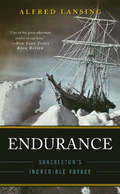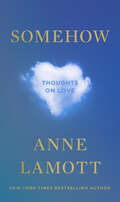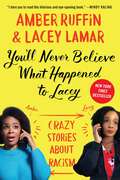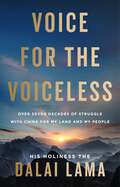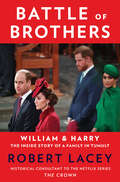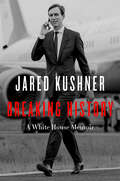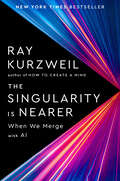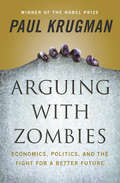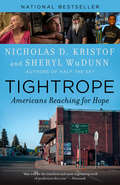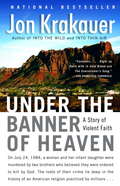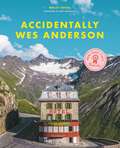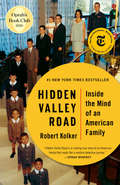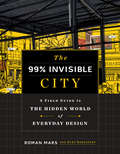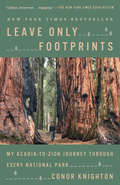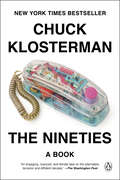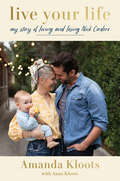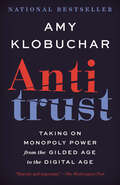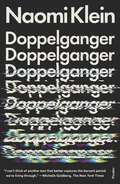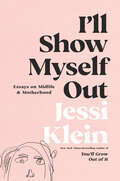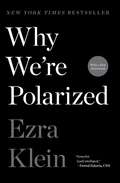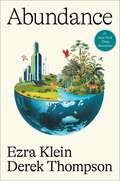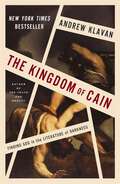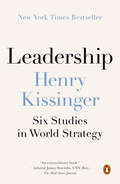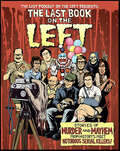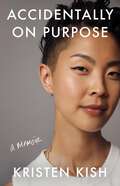Special Collections
New York Times Best Sellers - Non-Fiction
Description: Bookshare is pleased to offer the top 10 non-fiction books from the New York Times best seller list on a weekly basis. Books are added in as they become available. The month corresponds to the first time they appeared on the list. #adults
- Table View
- List View
Endurance
by Alfred LansingThe astonishing saga of polar explorer Ernest Shackleton's survival for over a year on the ice-bound Antarctic seas, as Time magazine put it, defined heroism. Alfred Lansing's scrupulously researched and brilliantly narrated book -- with over 200,000 copies sold -- has long been acknowledged as the definitive account of the Endurance's fateful trip. To write their authoritative story, Lansing consulted with ten of the surviving members and gained access to diaries and personal accounts by eight others. The resulting book has all the immediacy of a first-hand account, expanded with maps and illustrations especially for this edition.
New York Times Bestseller
Somehow
by Anne Lamott“Love is our only hope,” Anne Lamott writes in this perceptive new book. “It is not always the easiest choice, but it is always the right one, the noble path, the way home to safety, no matter how bleak the future looks.”
In Somehow: Thoughts on Love, Lamott explores the transformative power that love has in our lives: how it surprises us, forces us to confront uncomfortable truths, reminds us of our humanity, and guides us forward. “Love just won’t be pinned down,” she says. “It is in our very atmosphere” and lies at the heart of who we are. We are, Lamott says, creatures of love.
In each chapter of Somehow, Lamott refracts all the colors of the spectrum. She explores the unexpected love for a partner later in life. The bruised (and bruising) love for a child who disappoints, even frightens. The sustaining love among a group of sinners, for a community in transition, in the wider world. The lessons she underscores are that love enlightens as it educates, comforts as it energizes, sustains as it surprises.
Somehow is Anne Lamott’s twentieth book, and in it she draws from her own life and experience to delineate the intimate and elemental ways that love buttresses us in the face of despair as it galvanizes us to believe that tomorrow will be better than today. Full of the compassion and humanity that have made Lamott beloved by millions of readers, Somehow is classic Anne Lamott: funny, warm, and wise.
You'll Never Believe What Happened to Lacey
by Amber Ruffin and Lacey Lamar*An Indie Next Pick*Writer and performer on Late Night with Seth Meyers Amber Ruffin writes with her sister Lacey Lamar with humor and heart to share absurd anecdotes about everyday experiences of racism. Now a writer and performer on Late Night with Seth Meyers and host of The Amber Ruffin Show, Amber Ruffin lives in New York, where she is no one's First Black Friend and everyone is, as she puts it, "stark raving normal." But Amber's sister Lacey? She's still living in their home state of Nebraska, and trust us, you'll never believe what happened to Lacey.From racist donut shops to strangers putting their whole hand in her hair, from being mistaken for a prostitute to being mistaken for Harriet Tubman, Lacey is a lightning rod for hilariously ridiculous yet all-too-real anecdotes. She's the perfect mix of polite, beautiful, petite, and Black that apparently makes people think "I can say whatever I want to this woman." And now, Amber and Lacey share these entertainingly horrifying stories through their laugh-out-loud sisterly banter. Painfully relatable or shockingly eye-opening (depending on how often you have personally been followed by security at department stores), this book tackles modern-day racism with the perfect balance of levity and gravity.
Voice for the Voiceless
by Dalai LamaIn this unique book offering personal, spiritual, and historical reflections—some never shared before—His Holiness the Dalai Lama tells the full story of his struggle with China to save Tibet and its people for nearly seventy-five years.
The Dalai Lama has had to contend with the People’s Republic of China for about his entire life. He was sixteen years old when Communist China invaded Tibet in 1950, only nineteen when he had his first meeting with Chairman Mao in Beijing, and twenty-five when he was forced to escape to India and became a leader in exile. In the decades since, he has faced Communist China’s leaders—Mao Zedong, Deng Xiaoping, Jiang Zemin, Hu Jintao, and Xi Jinping—in his efforts to protect Tibet and its people, with their distinct language, culture, religion, history, and environment, in the face of the greatest possible obstacles.
Now, almost seventy-five years after China’s initial invasion of Tibet, the Dalai Lama reminds the world of Tibet’s unresolved struggle for freedom and the hardship his people continue to face in their own homeland. He offers his thoughts on the geopolitics of the region and shares how he personally was able to preserve his own humanity through the profound losses and challenges that threaten the very survival of the Tibetan people. This book captures the Dalai Lama’s extraordinary life journey—discovering what it means to lose your home to a repressive invader and to build a life in exile; dealing with the existential crisis of a nation, its people, and its culture and religion; and envisioning the path forward. Voice for the Voiceless is a powerful testimony from a global icon, who shares both his pain and his enduring hope in his people’s ongoing quest to restore dignity and freedom. New York Times Bestseller
Battle of Brothers
by Robert LaceyFrom bestselling author and historical consultant to the award-winning Netflix series The Crown, an unparalleled insider account of tumult, secrecy and schism in the Royal family. The world has watched Prince William and Prince Harry since they were born. Raised by Princess Diana to be the closest of brothers, how have the boy princes grown into very different, now distanced men?
From royal insider, biographer and historian Robert Lacey, this book reveals the untold details of William and Harry’s closeness and estrangement, asking what happens when two sons are raised for vastly different futures – one burdened with the responsibility of one day becoming king, the other with the knowledge that he will always remain spare. How have William and Harry both agreed and diverged in their views of what a modern royal owes to their country? Were the seeds of damage sowed by Prince Charles and Princess Diana as their marriage unraveled for all the world to see? In the previous generation, how have Prince Charles and Prince Andrew’s own relations strained under the Crown? What role has Queen Elizabeth II played in marshalling her feuding heirs? What parts have Kate Middleton and Meghan Markle played in helping their husbands to choose their differing paths? And what is the real, unvarnished story behind Harry and Meghan’s dramatic departure? In the most intimate vision yet of life behind closed doors, with its highs, lows and discretions all laid out, this is a journey into royal life as never offered before.
A New York Times Bestseller
Breaking History
by Jared KushnerJared Kushner was one of the most consequential presidential advisers in modern history. For the first time, he recounts what happened behind closed doors during the Trump presidency.
Few White House advisors have had such an expansive portfolio or constant access to the president. From his office next to Trump, senior adviser Jared Kushner operated quietly behind the scenes, preferring to leave the turf wars and television sparring to others. Now, Kushner finally tells his story—a fast-paced and surprisingly candid account of how an earnest businessman with no political ambitions found himself pulled into a presidency that no one saw coming.
Breaking History takes readers inside debates in the Oval Office, double-crosses at the United Nations, tense meetings in Arab palaces, high-stakes negotiations, and the daily barrage of leaks, false allegations, investigations, and West Wing infighting. A true historical thriller, this book is not your typical political memoir. Kushner details Washington’s intense resistance to change and reveals how he broke through the stalemates of the past. An outsider among outsiders, Kushner was a results-driven executive among beltway power brokers. He questioned old assumptions and delivered unprecedented results on trade, criminal justice reform, production of COVID-19 vaccines, and Middle East peace. His successful negotiation of the Abraham Accords, the most significant diplomatic breakthrough in 50 years, earned him a nomination for the Nobel Peace Prize. Written by one of the few people by Trump’s side from his trip down the golden escalator to his final departure from Andrews Air Force Base, Breaking History provides the most honest, nuanced, and definitive understanding of a presidency that will be studied for generations.
New York Times Bestseller
The Singularity Is Nearer
by Ray KurzweilAN INSTANT NEW YORK TIMES BESTSELLERONE OF TIME&’S 100 MOST INFLUENTUAL PEOPLE IN ARTIFICIAL INTELLIGENCEThe noted inventor and futurist&’s successor to his landmark book The Singularity Is Near explores how technology will transform the human race in the decades to comeSince it was first published in 2005, Ray Kurzweil&’s The Singularity Is Near and its vision of an exponential future have spawned a worldwide movement. Kurzweil's predictions about technological advancements have largely come true, with concepts like AI, intelligent machines, and biotechnology now widely familiar to the public.In this entirely new book Ray Kurzweil brings a fresh perspective to advances toward the Singularity—assessing his 1999 prediction that AI will reach human level intelligence by 2029 and examining the exponential growth of technology—that, in the near future, will expand human intelligence a millionfold and change human life forever. Among the topics he discusses are rebuilding the world, atom by atom with devices like nanobots; radical life extension beyond the current age limit of 120; reinventing intelligence by connecting our brains to the cloud; how exponential technologies are propelling innovation forward in all industries and improving all aspects of our well-being such as declining poverty and violence; and the growth of renewable energy and 3-D printing. He also considers the potential perils of biotechnology, nanotechnology, and artificial intelligence, including such topics of current controversy as how AI will impact employment and the safety of autonomous cars, and "After Life" technology, which aims to virtually revive deceased individuals through a combination of their data and DNA.The culmination of six decades of research on artificial intelligence, The Singularity Is Nearer is Ray Kurzweil&’s crowning contribution to the story of this science and the revolution that is to come.
Arguing with Zombies
by Paul KrugmanAn accessible, compelling introduction to today’s major policy issues from the New York Times columnist, best-selling author, and Nobel prize–winning economist Paul Krugman.
There is no better guide than Paul Krugman to basic economics, the ideas that animate much of our public policy. Likewise, there is no stronger foe of zombie economics, the misunderstandings that just won’t die.
In Arguing with Zombies, Krugman tackles many of these misunderstandings, taking stock of where the United States has come from and where it’s headed in a series of concise, digestible chapters. Drawn mainly from his popular New York Times column, they cover a wide range of issues, organized thematically and framed in the context of a wider debate. Explaining the complexities of health care, housing bubbles, tax reform, Social Security, and so much more with unrivaled clarity and precision, Arguing with Zombies is Krugman at the height of his powers.
Arguing with Zombies puts Krugman at the front of the debate in the 2020 election year and is an indispensable guide to two decades’ worth of political and economic discourse in the United States and around the globe. With quick, vivid sketches, Krugman turns his readers into intelligent consumers of the daily news and hands them the keys to unlock the concepts behind the greatest economic policy issues of our time. In doing so, he delivers an instant classic that can serve as a reference point for this and future generations.
A New York Times Bestseller
Tightrope
by Nicholas D. Kristof and Sheryl WuDunnNATIONAL BESTSELLER • With stark poignancy and political dispassion Tightrope addresses the crisis in working-class America while focusing on solutions to mend a half century of governmental failure. This must-read book from the authors of Half the Sky &“shows how we can and must do better&” (Katie Couric)."A deft and uniquely credible exploration of rural America, and of other left-behind pockets of our country. One of the most important books I've read on the state of our disunion."—Tara Westover, author of Educated Drawing us deep into an &“other America,&” the authors tell this story, in part, through the lives of some of the people with whom Kristof grew up, in rural Yamhill, Oregon. It&’s an area that prospered for much of the twentieth century but has been devastated in the last few decades as blue-collar jobs disappeared. About a quarter of the children on Kristof&’s old school bus died in adulthood from drugs, alcohol, suicide, or reckless accidents. While these particular stories unfolded in one corner of the country, they are representative of many places the authors write about, ranging from the Dakotas and Oklahoma to New York and Virginia. With their superb, nuanced reportage, Kristof and WuDunn have given us a book that is both riveting and impossible to ignore.
Under the Banner of Heaven
by Jon KrakauerNATIONAL BESTSELLER • From the author of Into the Wild and Into Thin Air, this extraordinary work of investigative journalism takes readers inside America&’s isolated Mormon Fundamentalist communities. • Now an acclaimed FX limited series streaming on HULU.&“Fantastic.... Right up there with In Cold Blood and The Executioner&’s Song.&” —San Francisco ChronicleDefying both civil authorities and the Mormon establishment in Salt Lake City, the renegade leaders of these Taliban-like theocracies are zealots who answer only to God; some 40,000 people still practice polygamy in these communities. At the core of Krakauer&’s book are brothers Ron and Dan Lafferty, who insist they received a commandment from God to kill a blameless woman and her baby girl. Beginning with a meticulously researched account of this appalling double murder, Krakauer constructs a multi-layered, bone-chilling narrative of messianic delusion, polygamy, savage violence, and unyielding faith. Along the way he uncovers a shadowy offshoot of America&’s fastest growing religion, and raises provocative questions about the nature of religious belief.
Accidentally Wes Anderson
by Wally KovalA visual adventure of Wes Anderson proportions, authorized by the legendary filmmaker himself: stunning photographs of real-life places that seem plucked from the just-so world of his films, presented with fascinating human stories behind each façade. Accidentally Wes Anderson began as a personal travel bucket list, a catalog of visually striking and historically unique destinations that capture the imagined worlds of Wes Anderson.
Now, inspired by a community of more than one million Adventurers, Accidentally Wes Anderson tells the stories behind more than 200 of the most beautiful, idiosyncratic, and interesting places on Earth. This book, authorized by Wes Anderson himself, travels to every continent and into your own backyard to identify quirky landmarks and undiscovered gems: places you may have passed by, some you always wanted to explore, and many you never knew existed. Fueled by a vision for distinctive design, stunning photography, and unexpected narratives, Accidentally Wes Anderson is a passport to inspiration and adventure. Perfect for modern travelers and fans of Wes Anderson's distinctive aesthetic, this is an invitation to look at your world through a different lens.
A New York Times Bestseller
Hidden Valley Road
by Robert Kolker#1 NEW YORK TIMES BESTSELLER • OPRAH&’S BOOK CLUB PICK • ONE OF GQ's TOP 50 BOOKS OF LITERARY JOURNALISM IN THE 21st CENTURY • The heartrending story of a midcentury American family with twelve children, six of them diagnosed with schizophrenia, that became science's great hope in the quest to understand the disease. "Reads like a medical detective journey and sheds light on a topic so many of us face: mental illness." —Oprah WinfreyDon and Mimi Galvin seemed to be living the American dream. After World War II, Don's work with the Air Force brought them to Colorado, where their twelve children perfectly spanned the baby boom: the oldest born in 1945, the youngest in 1965. In those years, there was an established script for a family like the Galvins--aspiration, hard work, upward mobility, domestic harmony--and they worked hard to play their parts. But behind the scenes was a different story: psychological breakdown, sudden shocking violence, hidden abuse. By the mid-1970s, six of the ten Galvin boys, one after another, were diagnosed as schizophrenic. How could all this happen to one family?What took place inside the house on Hidden Valley Road was so extraordinary that the Galvins became one of the first families to be studied by the National Institute of Mental Health. Their story offers a shadow history of the science of schizophrenia, from the era of institutionalization, lobotomy, and the schizophrenogenic mother to the search for genetic markers for the disease, always amid profound disagreements about the nature of the illness itself. And unbeknownst to the Galvins, samples of their DNA informed decades of genetic research that continues today, offering paths to treatment, prediction, and even eradication of the disease for future generations.With clarity and compassion, bestselling and award-winning author Robert Kolker uncovers one family's unforgettable legacy of suffering, love, and hope.
The 99% Invisible City
by Roman Mars and Kurt KohlstedtA beautifully designed guidebook to the unnoticed yet essential elements of our cities, from the creators of the wildly popular 99% Invisible podcast Have you ever wondered what those bright, squiggly graffiti marks on the sidewalk mean? Or stopped to consider why you don't see metal fire escapes on new buildings? Or pondered the story behind those dancing inflatable figures in car dealerships?
99% Invisible is a big-ideas podcast about small-seeming things, revealing stories baked into the buildings we inhabit, the streets we drive, and the sidewalks we traverse. The show celebrates design and architecture in all of its functional glory and accidental absurdity, with intriguing tales of both designers and the people impacted by their designs.
Now, in The 99% Invisible City: A Field Guide to Hidden World of Everyday Design, host Roman Mars and coauthor Kurt Kohlstedt zoom in on the various elements that make our cities work, exploring the origins and other fascinating stories behind everything from power grids and fire escapes to drinking fountains and street signs. With deeply researched entries and beautiful line drawings throughout, The 99% Invisible City will captivate devoted fans of the show and anyone curious about design, urban environments, and the unsung marvels of the world around them.
A New York Times Bestseller
Leave Only Footprints
by Conor KnightonFrom CBS Sunday Morning correspondent Conor Knighton, a behind-the-scenery look at his year traveling to each of America's National Parks, discovering the most beautiful places and most interesting people our country has to offerWhen Conor Knighton set off to explore America's "best idea," he worried the whole thing could end up being his worst idea.
A broken engagement and a broken heart had left him longing for a change of scenery, but the plan he'd cooked up in response had gone a bit overboard in that department: Over the course of a single year, Knighton would visit every national park in the country, from Acadia to Zion. In Leave Only Footprints, Knighton shares informative and entertaining dispatches from what turned out to be the road trip of a lifetime. Whether he's waking up early for a naked scrub in a historic bathhouse in Arkansas or staying up late to stargaze along our loneliest highway in Nevada, Knighton weaves together the type of stories you're not likely to find in any guidebook.
Through his unique lens, America the Beautiful becomes America the Captivating, the Hilarious, and the Inspiring. Along the way, he identifies the threads that tie these wildly different places together—and that tie us to nature—and reveals how his trip ended up changing his views on everything from God and love to politics and technology. Filled with fascinating tidbits about our parks' past and reflections on their fragile future, this book is both a celebration of and a passionate case for the natural wonders that all Americans share.
A New York Times Bestseller
The Nineties
by Chuck KlostermanFrom the New York Times bestselling author of But What if We’re Wrong, a wise and funny reckoning with the decade that gave us slacker/grunge irony about the sin of trying too hard, during the greatest shift in human consciousness of any decade in American history.
It was long ago, but not as long as it seems: The Berlin Wall fell and the Twin Towers collapsed. In between, one presidential election was allegedly decided by Ross Perot while another was plausibly decided by Ralph Nader. In the beginning, almost every name and address was listed in a phone book, and everyone answered their landlines because you didn’t know who it was. By the end, exposing someone’s address was an act of emotional violence, and nobody picked up their new cell phone if they didn’t know who it was. The 90s brought about a revolution in the human condition we’re still groping to understand. Happily, Chuck Klosterman is more than up to the job.
Beyond epiphenomena like "Cop Killer" and Titanic and Zima, there were wholesale shifts in how society was perceived: the rise of the internet, pre-9/11 politics, and the paradoxical belief that nothing was more humiliating than trying too hard. Pop culture accelerated without the aid of a machine that remembered everything, generating an odd comfort in never being certain about anything. On a 90&’s Thursday night, more people watched any random episode of Seinfeld than the finale of Game of Thrones. But nobody thought that was important; if you missed it, you simply missed it. It was the last era that held to the idea of a true, hegemonic mainstream before it all began to fracture, whether you found a home in it or defined yourself against it.
In The Nineties, Chuck Klosterman makes a home in all of it: the film, the music, the sports, the TV, the politics, the changes regarding race and class and sexuality, the yin/yang of Oprah and Alan Greenspan. In perhaps no other book ever written would a sentence like, “The video for ‘Smells Like Teen Spirit’ was not more consequential than the reunification of Germany” make complete sense.
Chuck Klosterman has written a multi-dimensional masterpiece, a work of synthesis so smart and delightful that future historians might well refer to this entire period as Klostermanian.
New York Times Bestseller
Live Your Life
by Amanda Kloots and Anna KlootsAmanda Kloots bravely reflects on love, loss, and life with her husband, Broadway star, and Tony Award nominee Nick Cordero, whose public battle with COVID-19 and tragic death made headlines around the world.In March 2020, Broadway star and Tony Award nominee Nick Cordero was hospitalized for what he and his wife, Amanda Kloots, believed to be a severe case of pneumonia. Entering the hospital, they had every reason to believe that Nick—a young father and otherwise healthy man—would return home. After an eventual diagnosis of COVID-19 that led to Nick’s being placed on a ventilator, Amanda took to documenting their journey on social media, showing the dangers COVID-19 posed to everyone, regardless of age. Her updates quickly captivated millions, inspiring people around the globe to dance each day to Nick’s song “Live Your Life” and offer positive thoughts and prayer. When he passed away after ninety-five grueling days in the ICU, the world grieved for Amanda, her infant son, Elvis, and the future COVID-19 had snatched away from them.Live Your Life is the story of Nick and Amanda’s life together—of their beautiful relationship, of Nick’s dramatic fight for survival, of those sudden tragic months that permanently changed her world and ours—and of their interrupted future as a family. From the confusing early days of his illness to searching for signs of hope in every update from the doctors to the healing sound of Elvis’s laughter, Amanda details how she approached even the most devastating moments with the personal optimism and faith that have shaped her life. Written with her sister Anna Kloots, who was with her every step of this journey, Live Your Life explores how Amanda’s willingness to accept help from an entire community of people—friends, family, and even total strangers—played a vital role in enduring this hardship. In the process, she offers a touching meditation on how even the worst times have silver linings that deepen our connections to the world around us and to the people who matter most. What emerges is an inspiring and unexpectedly uplifting message for life in the time of COVID, a vision of courage for anyone coping with overwhelming loss or the collective trauma of what the pandemic has taken from us. A poignant reflection on love, hope, motherhood, and the transformational power of music, Live Your Life is a love letter to Nick and a reminder that, sometimes, celebrating life today is the only path through tomorrow’s darkness.Live Your Life includes 16 pages of color photos exclusive to the book.
Antitrust
by Amy KlobucharAntitrust enforcement is one of the most pressing issues facing America today—and Amy Klobuchar, the widely respected senior senator from Minnesota, is leading the charge. This fascinating history of the antitrust movement shows us what led to the present moment and offers achievable solutions to prevent monopolies, promote business competition, and encourage innovation.
In a world where Google reportedly controls 90 percent of the search engine market and Big Pharma’s drug price hikes impact healthcare accessibility, monopolies can hurt consumers and cause marketplace stagnation. Klobuchar—the much-admired former candidate for president of the United States—argues for swift, sweeping reform in economic, legislative, social welfare, and human rights policies, and describes plans, ideas, and legislative proposals designed to strengthen antitrust laws and antitrust enforcement.
Klobuchar writes of the historic and current fights against monopolies in America, from Standard Oil and the Sherman Anti-Trust Act to the Progressive Era's trust-busters; from the breakup of Ma Bell (formerly the world's biggest company and largest private telephone system) to the pricing monopoly of Big Pharma and the future of the giant tech companies like Facebook, Amazon, and Google. She begins with the Gilded Age (1870s-1900), when builders of fortunes and rapacious robber barons such as J. P. Morgan, John Rockefeller, and Cornelius Vanderbilt were reaping vast fortunes as industrialization swept across the American landscape, with the rich getting vastly richer and the poor, poorer.
She discusses President Theodore Roosevelt, who, during the Progressive Era (1890s-1920), "busted" the trusts, breaking up monopolies; the Clayton Act of 1914; the Federal Trade Commission Act of 1914; and the Celler-Kefauver Act of 1950, which it strengthened the Clayton Act. She explores today's Big Pharma and its price-gouging; and tech, television, content, and agriculture communities and how a marketplace with few players, or one in which one company dominates distribution, can hurt consumer prices and stifle innovation.
As the ranking member of the Senate Judiciary Subcommittee on Antitrust, Competition Policy, and Consumer Rights, Klobuchar provides a fascinating exploration of antitrust in America and offers a way forward to protect all Americans from the dangers of curtailed competition, and from vast information gathering, through monopolies.
A New York Times Best Seller
Doppelganger
by Naomi KleinA finalist for the 2023 National Book Critics Circle AwardWinner of the Women's Prize for NonfictionNEW YORK TIMES BESTSELLER | National Indie BestsellerA New York Times notable book of 2023 | Vulture’s #1 book of 2023One of Slate’s ten best books of 2023 | A Guardian best ideas book of 2023 | One of Time’s ten best books of 2023 | Winner of the Pacific Northwest Book Award“I’ve been raving about Naomi Klein’s Doppelganger . . . I can’t think of another text that better captures the berserk period we’re living through.” —Michelle Goldberg, The New York Times“If I had to name a single book that makes sense of these last few dark years, it would be this one.” —Katie Roiphe, The New York Times Book Review (Editors’ Choice)What if you woke up one morning and found you’d acquired another self—a double who was almost you and yet not you at all? What if that double shared many of your preoccupations but, in a twisted, upside-down way, furthered the very causes you’d devoted your life to fighting against?Not long ago, the celebrated activist and public intellectual Naomi Klein had just such an experience—she was confronted with a doppelganger whose views she found abhorrent but whose name and public persona were sufficiently similar to her own that many people got confused about who was who. Destabilized, she lost her bearings, until she began to understand the experience as one manifestation of a strangeness many of us have come to know but struggle to define: AI-generated text is blurring the line between genuine and spurious communication; New Age wellness entrepreneurs turned anti-vaxxers are scrambling familiar political allegiances of left and right; and liberal democracies are teetering on the edge of absurdist authoritarianism, even as the oceans rise. Under such conditions, reality itself seems to have become unmoored. Is there a cure for our moment of collective vertigo?Naomi Klein is one of our most trenchant and influential social critics, an essential analyst of what branding, austerity, and climate profiteering have done to our societies and souls. Here she turns her gaze inward to our psychic landscapes, and outward to the possibilities for building hope amid intersecting economic, medical, and political crises. With the assistance of Sigmund Freud, Jordan Peele, Alfred Hitchcock, and bell hooks, among other accomplices, Klein uses wry humor and a keen sense of the ridiculous to face the strange doubles that haunt us—and that have come to feel as intimate and proximate as a warped reflection in the mirror.Combining comic memoir with chilling reportage and cobweb-clearing analysis, Klein seeks to smash that mirror and chart a path beyond despair. Doppelganger asks: What do we neglect as we polish and perfect our digital reflections? Is it possible to dispose of our doubles and overcome the pathologies of a culture of multiplication? Can we create a politics of collective care and undertake a true reckoning with historical crimes? The result is a revelatory treatment of the way many of us think and feel now—and an intellectual adventure story for our times.
I'll Show Myself Out
by Jessi KleinThe eagerly anticipated second essay collection from Jessi Klein, author of the acclaimed New York Times bestselling debut You’ll Grow Out of It.“
Sometimes I think about how much bad news there is to tell my kid, the endlessly long, looping CVS receipt scroll of truly terrible things that have happened, and I want to get under the bed and never come out. How do we tell them about all this? Can we just play Billy Joel’s We Didn’t Start the Fire and then brace for questions? The first of which should be, how is this a song that played on the radio?”
In New York Times bestselling author and Emmy Award-winning writer and producer Jessi Klein’s second collection, she hilariously explodes the cultural myths and impossible expectations around motherhood and explore the humiliations, poignancies, and possibilities of midlife. In interconnected essays like “Listening to Beyoncé in the Parking Lot of Party City,” “Your Husband Will Remarry Five Minutes After You Die,” “Eulogy for My Feet,” and “An Open Love Letter to Nate Berkus and Jeremiah Brent,” Klein explores this stage of life in all its cruel ironies, joyous moments, and bittersweetness.
Written with Klein’s signature candor and humanity, I'll Show Myself Out is an incisive, moving, and often uproarious collection.
New York Times Bestseller
Why We're Polarized
by Ezra KleinONE OF BARACK OBAMA&’S FAVORITE BOOKS OF 2022 One of Bill Gates&’s &“5 books to read this summer,&” this New York Times and Wall Street Journal bestseller shows us that America&’s political system isn&’t broken. The truth is scarier: it&’s working exactly as designed. In this &“superbly researched&” (The Washington Post) and timely book, journalist Ezra Klein reveals how that system is polarizing us—and how we are polarizing it—with disastrous results.&“The American political system—which includes everyone from voters to journalists to the president—is full of rational actors making rational decisions given the incentives they face,&” writes political analyst Ezra Klein. &“We are a collection of functional parts whose efforts combine into a dysfunctional whole.&” &“A thoughtful, clear and persuasive analysis&” (The New York Times Book Review), Why We&’re Polarized reveals the structural and psychological forces behind America&’s descent into division and dysfunction. Neither a polemic nor a lament, this book offers a clear framework for understanding everything from Trump&’s rise to the Democratic Party&’s leftward shift to the politicization of everyday culture. America is polarized, first and foremost, by identity. Everyone engaged in American politics is engaged, at some level, in identity politics. Over the past fifty years in America, our partisan identities have merged with our racial, religious, geographic, ideological, and cultural identities. These merged identities have attained a weight that is breaking much in our politics and tearing at the bonds that hold this country together. Klein shows how and why American politics polarized around identity in the 20th century, and what that polarization did to the way we see the world and one another. And he traces the feedback loops between polarized political identities and polarized political institutions that are driving our system toward crisis. &“Well worth reading&” (New York magazine), this is an &“eye-opening&” (O, The Oprah Magazine) book that will change how you look at politics—and perhaps at yourself.
Abundance
by Derek Thompson and Ezra KleinFrom bestselling authors and journalistic titans Ezra Klein and Derek Thompson, Abundance is a once-in-a-generation, paradigm-shifting call to renew a politics of plenty, face up to the failures of liberal governance, and abandon the chosen scarcities that have deformed American life.
To trace the history of the twenty-first century so far is to trace a history of unaffordability and shortage. After years of refusing to build sufficient housing, America has a national housing crisis. After years of limiting immigration, we don’t have enough workers. Despite decades of being warned about the consequences of climate change, we haven’t built anything close to the clean-energy infrastructure we need. Ambitious public projects are finished late and over budget—if they are ever finished at all. The crisis that’s clicking into focus now has been building for decades—because we haven’t been building enough.
Abundance explains that our problems today are not the results of yesteryear’s villains. Rather, one generation’s solutions have become the next generation’s problems. Rules and regulations designed to solve the problems of the 1970s often prevent urban-density and green-energy projects that would help solve the problems of the 2020s. Laws meant to ensure that government considers the consequences of its actions have made it too difficult for government to act consequentially. In the last few decades, our capacity to see problems has sharpened while our ability to solve them has diminished. Progress requires facing up to the institutions in life that are not working as they need to. It means, for liberals, recognizing when the government is failing. It means, for conservatives, recognizing when the government is needed.
In a book exploring how we can move from a liberalism that not only protects and preserves but also builds, Klein and Thompson trace the political, economic, and cultural barriers to progress and propose a path toward a politics of abundance. At a time when movements of scarcity are gaining power in country after country, this is an answer that meets the challenges of the moment while grappling honestly with the fury so many rightfully feel. New York Times Bestseller
The Kingdom of Cain
by Andrew KlavanINSTANT NEW YORK TIMES BESTSELLER
Andrew Klavan explores how artists' imaginative engagement with the darkness can point the way to living beautifully in the midst of a tragic world.
"Andrew Klavan's book illuminates even as it explores the deepest darkness, finding truth and beauty in art born of unflinching confrontations with evil." --Daniel McCarthy, editor-in-chief, Modern Age
In his USA Today bestselling The Truth and Beauty, Andrew Klavan explored how the work of great poets helps illuminate the truth of the gospels. Now, the award-winning screenwriter and crime novelist turns his attention to the dark side of human nature to discover how we might find joy and beauty in the world while still being clear-eyed about the evil found in it.
The Kingdom of Cain looks at three murders in history--including the first murder, Cain's killing of his brother, Abel--and at the art created from imaginative engagement with those horrific events by artists ranging from Fyodor Dostoevsky to Alfred Hitchcock. To make beauty out of the world as it is--shot through with evil and injustice and suffering--is the task not just of the artist but, Klavan argues, of every life rightly lived.
Examining how that transformation occurs in art grants us a vision for how it can happen in our lives. Klavan eloquently argues that it is possible to be clear-eyed about the evil in the world while remaining hope-filled about God's ability to redeem it all. New York Times Bestseller
Leadership
by Henry KissingerThe New York Times bestsellerHenry Kissinger, consummate diplomat and statesman, examines the strategies of six great twentieth-century figures and brings to life a unifying theory of leadership and diplomacy&“An extraordinary book, one that braids together two through lines in the long and distinguished career of former Secretary of State Henry Kissinger...In Leadership he presents a fascinating set of historical case studies and political biographies that blend the dance and the dancer, seamlessly.&” - James Stavridis, The Wall Street Journal&“Leaders,&” writes Henry Kissinger in this compelling book, &“think and act at the intersection of two axes: the first, between the past and the future; the second, between the abiding values and aspirations of those they lead. They must balance what they know, which is necessarily drawn from the past, with what they intuit about the future, which is inherently conjectural and uncertain. It is this intuitive grasp of direction that enables leaders to set objectives and lay down a strategy.&” In Leadership, Kissinger analyses the lives of six extraordinary leaders through the distinctive strategies of statecraft, which he believes they embodied. After the Second World War, Konrad Adenauer brought defeated and morally bankrupt Germany back into the community of nations by what Kissinger calls &“the strategy of humility.&” Charles de Gaulle set France beside the victorious Allies and renewed its historic grandeur by &“the strategy of will.&” During the Cold War, Richard Nixon gave geostrategic advantage to the United States by &“the strategy of equilibrium.&” After twenty-five years of conflict, Anwar Sadat brought a vision of peace to the Middle East by a &“strategy of transcendence.&” Against the odds, Lee Kuan Yew created a powerhouse city-state, Singapore, by &“the strategy of excellence.&” And, though Britain was known as &“the sick man of Europe&” when Margaret Thatcher came to power, she renewed her country&’s morale and international position by &“the strategy of conviction.&” To each of these studies, Kissinger brings historical perception, public experience and—because he knew each of the subjects and participated in many of the events he describes—personal knowledge. Leadership is enriched by insights and judgements that only Kissinger could make and concludes with his reflections on world order and the indispensability of leadership today.
The Last Book on the Left
by Ben Kissel and Marcus Parks and Henry ZebrowskiThis “delightfully creepy” New York Times bestseller from the award-winning horror-comedy podcast team takes deep dives into nine infamous serial killers (Booklist).Since its first show in 2010, The Last Podcast on the Left has barreled headlong into all things horror, covering subjects spanning Jeffrey Dahmer, Jonestown, and various supernatural phenomena. Deeply researched but with a morbidly humorous bent, the podcast has earned a dedicated and aptly cultlike following for its unique take on all things macabre.In their first book, the guys take a deep dive into history’s most infamous serial killers, from Ted Bundy to John Wayne Gacy, exploring their origin stories, haunting habits, and perverse predilections. Featuring newly developed content alongside updated fan favorites, each profile is an exhaustive examination of the darker side of human existence. With appropriately creepy four-color illustrations throughout, The Last Book on the Left will satisfy the bloodlust of readers everywhere. “A fully illustrated compendium that revisits in print nine of the most notorious killers covered on the podcast, re-investigating the subjects and going through two rounds of fact-checking to provide definitive accounts of murderers from John Wayne Gacy to the Son of Sam to Soviet serial killer Andrei Chikatilo, which at the same time question their mythical status in our collective psyche and nightmares.”–Rolling Stone
Accidentally on Purpose
by Kristen KishTIME's Most Anticipated Books of 2025 | New York Post's 30 Best Books for Spring | Amazon's Best Books of the Month | BookRiot's Best Books of April | Queerty's Spring 2025 LGBTQ+ Books | Town & Country's Must-Read Books of Spring 2025
A tender, clear-eyed memoir, Accidentally on Purpose charts a journey full of purpose, belonging, and real love—a “recipe for a life worth living” (Stacy London). Kristen Kish never could have imagined people on the street knowing her name—not when she was a carefree softball-tossing kid, in high school working at a pretzel stand, and not even when she finally found her true calling as a chef. In those early days, becoming a chef meant tethering oneself to a restaurant and working in the back of a kitchen, not a television set. But working in the spotlight happened naturally, even if the attention was totally unanticipated. And like most things in Kristen’s life, the road was so much more winding and complicated than it may have appeared from the outside.
From growing up as an adoptee in the Midwest, to trying to fit in with all the other girls who were busy dating boys, to coming out and finding love when she least expected it, Kristen learned that, unlike a map, no set of plans or definitions can dictate or explain a life. In fact, accidents happen. Curveballs will come. And even the full-circle moments—like winning Top Chef to becoming its Emmy-nominated host years later—could not have guaranteed these opportunities.
In Accidentally on Purpose, what defines Kristen’s story aren’t the missteps or even the pleasant surprises that crop up but how she learned to find her voice and use it. Because while accidents may be unexpected, they don’t have to be at odds with purpose. And as Kristen approaches life’s milestones, big and small, with intention, she realizes at those junctures—the ones beyond the borders of the map, behind-the-scenes, and off camera—are where the decisions and discoveries are made. Where the unexpected meets the intentional. And that’s where things get really interesting. New York Times Bestseller
